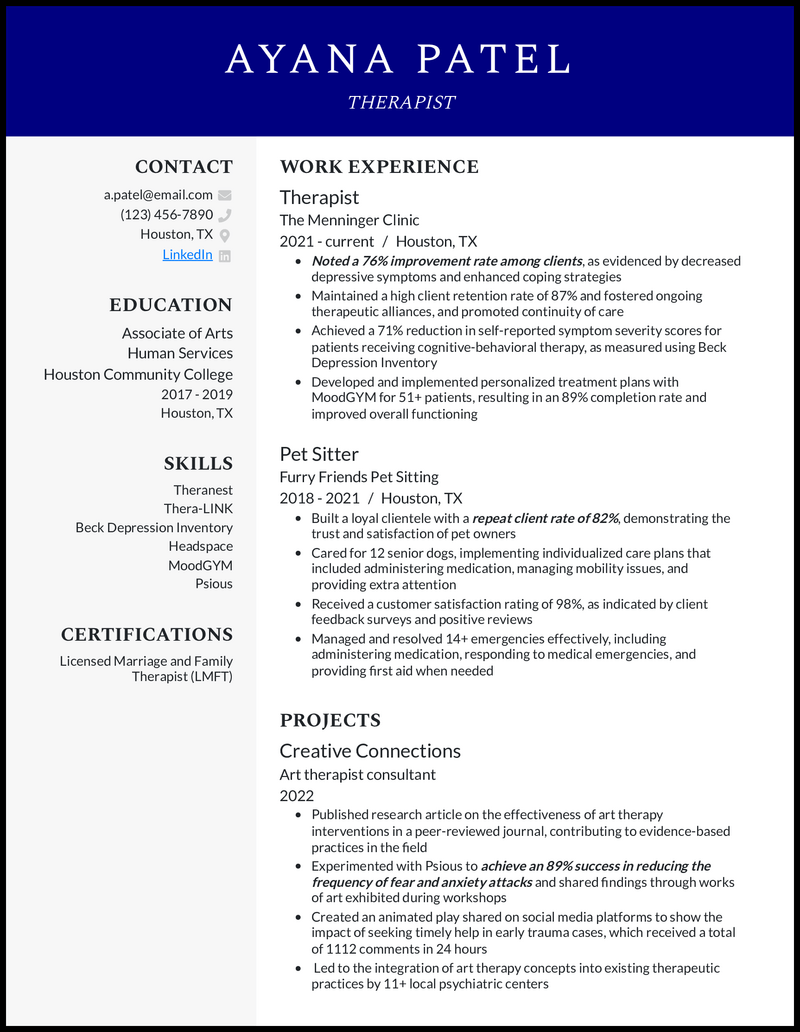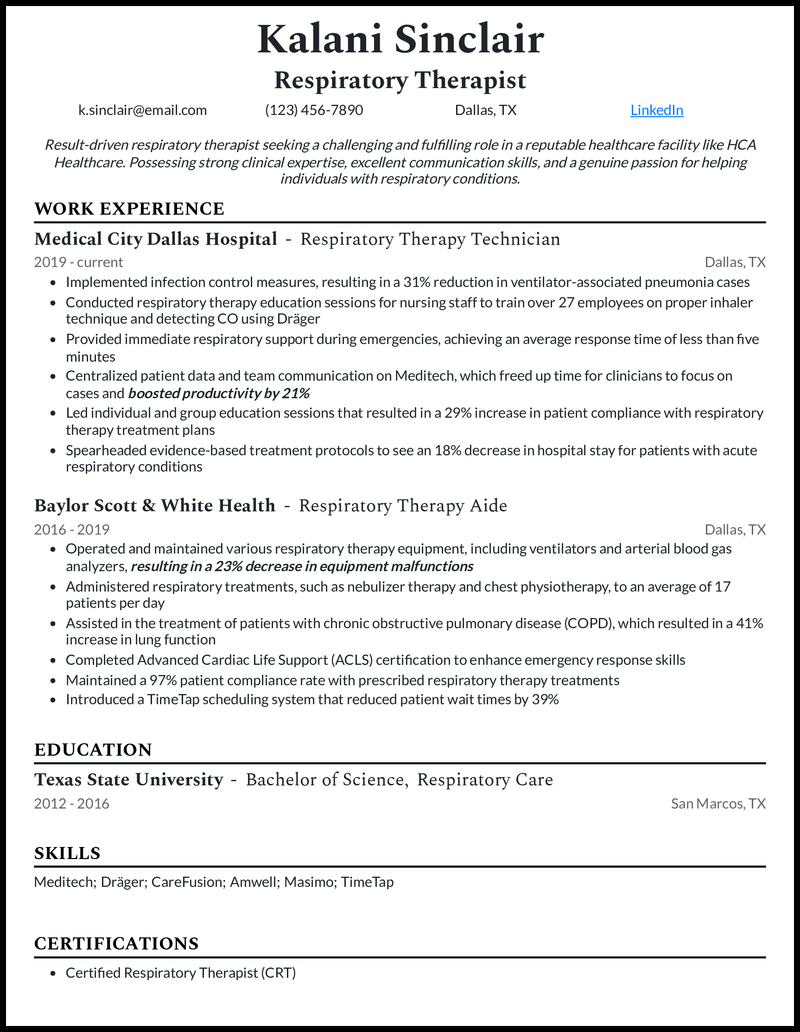Fostering well-being and growth is your aim as a therapist—a goal you can only pull off thanks to years of training and study. You identify underlying issues before they escalate and use your empathic approach to facilitate healing and personal development.
From anxiety to physical ailments, you address a range of challenges, making a positive impact on everyone you work with. Your skill set is difficult to put in words, though, but you’ll have to rise to the challenge to advance in your career.
Don’t worry—our therapist resume examples will show you all the tricks you need to know to catch the attention of employers and earn yourself the interviews you want.
Why this resume works
- Compassion in patient care and successfully implementing programs that boost outcomes are some of the pillars of an impressive career in therapy. Also, do not overlook your art project to spread awareness of early interventions in trauma cases.
- In fact, your therapist resume should mention your research article to add evidence-based information for patients and practitioners alike.
Why this resume works
- Since therapists play a major role in helping people overcome their PTSD, anxiety, depression, stress, and relationships, employers can’t just pick any mental health therapist resume randomly.
- They’ll need someone credible and who’s done their education and dedicated their entire career to this single field. Ensure that your resume includes a degree in psychology. Another great addition is using licenses such as a Licensed Professional Counselor (LPC) to further prove your expertise.
Why this resume works
- Your radiation therapist resume will be no good if you cannot mention that you’re well-versed with all procedures from start to end.
- Instead of just adding radiology tools in your skills section, try adding equipment or software such as SunCHECK and CT Simulation to prove that you know how to handle mock-up procedures and take all necessary precautions before starting with the actual therapy itself.
Why this resume works
- Advanced training to add more skills to your career is the fastest lane to becoming the most sought-after massage expert with potential employers. It positions you for growth in a changing work environment to suit the shifting needs of customers.
- Therefore, including your 151+ hours of training in high-demand techniques in your massage therapist resume will propel you to the front of the pack.
Why this resume works
- It’s not just your core therapy skills that matter when securing your next big job. Your competencies in technologies that help support clinicians in their daily patient care count as much as your other hands-on skills.
- For example, your respiratory therapist resume should mention the integration of Meditech in managing patient data and team communication to create more time for clinicians to attend to patients.
Related resume examples
Tailor Your Therapist Resume to Express Your Interest

The skills section of your therapist resume should cover a comprehensive selection of abilities. This includes therapeutic techniques, specialized interventions, and counseling approaches.
The exact scope of this section depends on your therapy niche. A massage therapist will include various massage modalities, but a counselor will focus on things like CBT and DBT. Interpersonal skills and communication are, of course, essential to success as a therapist, so make sure to include these as well. Let the job description be your guide for this.
Don’t forget to mention the technical stuff, too—your proficiency in electronic health record (EHR) systems and telehealth platforms validate your experience and skill.
Need some ideas?
15 best therapist skills
- Individual Counseling
- Group Therapy
- CBT
- Mindfulness
- Trauma Care
- DBT
- Massage Modalities
- Zoom
- Theranest
- Patient Diagnosis
- Crisis Intervention
- Cultural Competence
- EFT
- Respiratory Techniques
- Headspace

Your therapist work experience bullet points
Your work experience section is an opportunity to showcase the profound impact you’ve made on people’s lives—in other words, your professional accomplishments. Focus on milestones like breakthroughs in clients’ emotional growth or achieving substantial progress in their well-being, whether mental or physical health.
While you’ll have the chance to discuss things in more depth during interviews, in your resume, everything needs to be concise, and the best way to convey success concisely is with numbers. This means quantifying your achievements with stats like increased session attendance or patient satisfaction ratings.
Pay attention to the language you use as well—active verbs are very powerful here, as they highlight your pivotal role in your client’s health journeys.
- Highlight the success of your interventions by quantifying the reduction in clients’ symptom severity over a defined period.
- Demonstrate your ability to establish rapport and maintain client engagement by citing an increased attendance rate for therapy sessions.
- Showcase your proficiency in helping clients achieve their treatment goals by referencing the percentage of clients who successfully met their objectives.
- Illustrate the quality of your therapeutic services by referring to high client satisfaction scores obtained through post-session surveys.
See what we mean?
- Centralized patient data and team communication on Meditech, which freed up time for clinicians to focus on cases and boosted productivity by 21%
- Maintained a client satisfaction rate of 96% through exceptional customer service and personalized treatments, as captured in post-service surveys
- Noted a 76% improvement rate among clients, as evidenced by decreased depressive symptoms and enhanced coping strategies
- Developed and implemented personalized treatment plans with MoodGYM for 51+ patients, resulting in an 89% completion rate and improved overall functioning
9 active verbs to start your therapist work experience bullet points
- Facilitated
- Tailored
- Empowered
- Managed
- Implemented
- Championed
- Elevated
- Navigated
- Evaluated
3 Tips for Writing a Therapist Resume with Limited Experience
- Leverage your learning path
- Even with limited experience, emphasize relevant academic projects and internships in your therapist resume. For instance, detail your active involvement in developing a peer support group that fostered emotional well-being within your academic community.
- Strategic skill selection
- Rather than overwhelming your resume with every skill imaginable, focus on showcasing around ten skills that align with the job description. Tailor your skill set to the role; if the position emphasizes trauma-informed care, highlight how you implemented trauma-focused interventions during your internship.
- Highlight extra qualifications
- Beyond your formal education, showcase any additional certifications or specialized coursework you’ve completed. A therapist might include credentials like EMDR training, mindfulness workshops, or grief counseling certification, while a respiratory therapist should throw in the NBRC and the CRT. It all depends on your industry.
3 Tips for Writing a Therapist Resume as an Experienced Professional
- Talk about your background
- As a therapist, you may have worked in various settings. Discuss your past workplaces, such as hospitals, private clinics, or clients’ homes, and express how you tackled the unique challenges of each type of therapy.
- Quantify your impact
- Incorporate measurable metrics to showcase the positive outcomes you’ve achieved. Highlight the percentage of clients who reported improved well-being, the success rate of clients meeting their treatment goals, or even the increased revenue based on your unique approach to therapy.
- Stay current and engaged
- Demonstrate your commitment to continuous growth by mentioning recent certifications, workshops, or advanced training you’ve completed. To showcase your engagement, discuss your participation in workshops on cutting-edge therapeutic techniques or your attendance at conferences.
As your resume should be limited to one page (unless your work experience exceeds 10 years), mention your three most recent jobs. If you’ve worked with various therapy styles—for example, as a massage therapist and a deep tissue massage specialist—it might be good to mention both to showcase your diversity.
Emphasize transferable skills that bridge both careers and showcase your educational background. If you’re transitioning from a background in education, for example, underscore your communication skills and ability to create safe learning environments.
Prioritize skills directly relevant to the job description. Highlight competencies such as crisis intervention, specific therapeutic approaches, or cultural sensitivity to show that you’re ready to work with people from all walks of life.










